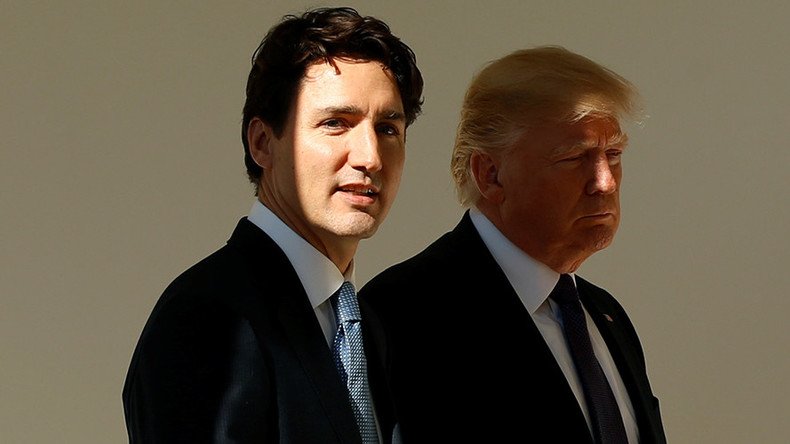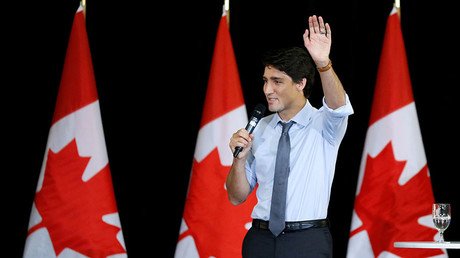Trump wants to 'tweak' outstanding trade relationship with Canada

US President Donald Trump and Canadian Prime Minister Justin Trudeau met for the first time at the White House. The two leaders focused on strengthening their countries’ relationship, free trade and women entrepreneurs, among other topics.
Trump and Trudeau held a joint press conference on Monday in the East Room of the White House.
The North American Free Trade Agreement (NAFTA) is expected to feature prominently in discussions between Trump and Trudeau. The American president has vowed to renegotiate the terms of the 1994 deal between the US, Canada and Mexico ‒ if not cancel it altogether. In 2015, trade between the US and its northern neighbor was worth $540 billion. Any new terms could have a potentially disastrous effect on the more than 100,000 Canadian jobs in the auto industry, according to Mark Manger, an associate professor at the University of Toronto's Munk School of Global Affairs.
Reworking NAFTA “is a concern for many Canadians because we know that our economy is very dependent on our bonds, our relationship with the United States,” Trudeau said in French. He noted that 35 US states list Canada as their biggest export partner, and that the two countries do $2 billion in trade each day.
Trump sought to allay those fears, saying that things with Canada would merely be tweaked, and the two countries’ relationship was in a much better place than the US relationship with Mexico.
“We have a very outstanding trade relationship with Canada. We’ll be tweaking it, we’ll be doing certain things that are going to benefit both our countries,” Trump said. “It’s a much less severe situation than what’s taken place on the southern border [with Mexico].”
“On the southern border, for many, many years, the transaction was not fair to the United States. It’s an extremely unfair transaction. We’re going to work with Mexico, we’re going to make it a fair deal for both parties,” he continued. “I think that we’re going to get along very well with Mexico.”
The president then praised companies like Ford, Intel, GM and Fiat-Chrysler for announcing “billions of dollars of new investments” in the US “because of what I’ve been doing and what I’m doing in terms of regulation, lowering taxes, et cetera, that kind of thing.”
One of the major differences between the liberal Trudeau and the conservative Trump has been how they view Syrian refugees. Canada has welcomed more than 40,000 Syrians with open arms, while Trump included the country in his executive order blocking nationals from seven majority-Muslim countries from entering the US for 90 days, as well as a 120-day halt on the immigration program. Those differences were underscored during the press conference when Trump was asked whether he was “confident the northern border is secure.”
President #Trump speaks on terror threat, immigration policy, at joint presser with Canadian PM #Trudeauhttps://t.co/gXoOZaTpMJpic.twitter.com/vrN3VX03Jl
— RT America (@RT_America) February 13, 2017
“You can never be totally confident, but through the incredible efforts ‒ already I see it happening ‒ of [Homeland Security Secretary John] Kelly, we have really done a great job. We’re actually taking people that are criminals ‒ very, very hardened criminals in some cases ‒ with a tremendous track record of abuse and problems, and we’re getting ‘em out,” Trump responded.
“On the home front, we have to create borders, we have to let people that can love our country in and I want to do that, we want to have a big, beautiful open door. And we want people to come in and come in our country, but we cannot let the wrong people in. And I will not allow that to happen during this administration,” he added. “People, citizens of our country want that, and that’s their attitude too, I will tell you. We are getting such praise for our stance, and it’s a stance of common sense.”
Trudeau did not praise the stance, however, but he didn’t condemn it, either. He highlighted the long-standing relationship between the two allies, dating back to World War I, but noted that, while the US and Canada don’t always agree, any differences are handled "firmly and respectfully."
"The last thing Canadians expect is for me to come down and lecture another country on how they choose to govern themselves," Trudeau said. "My role, our responsibility, is to continue to govern in such a way that reflects Canadians’ approach and be a positive example in the world.”
Canadian school cancels trips to US due to ‘unsafe’ political climatehttps://t.co/4mM6x7tCJ9
— RT (@RT_com) February 12, 2017
Before speaking to the press, the two men met for a photo op in the Oval Office. They then had a roundtable discussion with female CEOs spearheaded by First Daughter Ivanka Trump, herself a businesswoman. Trudeau is an ardent feminist, and Ivanka made women’s empowerment issues a hallmark of her work on her father’s presidential campaign. Trump and Trudeau also announced the creation of a United States-Canada Council for Advancement of Women Entrepreneurs and Business Leaders.
“We are committed to removing barriers to women’s participation in the business community and supporting women as they advance through it,” they said in a joint statement. “We expect this initiative to promote the growth of women-owned enterprises and to further contribute to our overall economic growth and competitiveness, as well as the enhanced integration of our economies.”
NEW: White House releases joint statement with Canadian Prime Minister Trudeau following meeting with Pres. Trump https://t.co/DSDYzKaNzvpic.twitter.com/qMkcr8v3ZJ
— This Week (@ThisWeekABC) February 13, 2017
The meeting included General Electric Canada CEO Elyse Allan; TransAlta Corp. CEO Dawn Farrell; Accenture North America CEO Julie Sweet; Investissement Québec Board Chair Monique Leroux; and Carol Stephenson of GM's board of directors, who represented GM CEO Mary Barra, AP reported.













